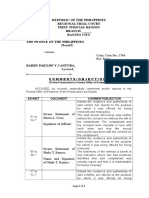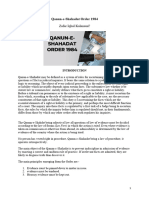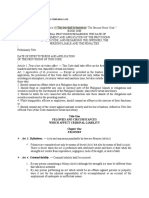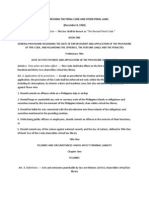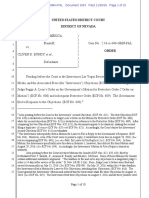0 ratings0% found this document useful (0 votes)
46 viewsConstitution, Art. III, Sec. 2
Constitution, Art. III, Sec. 2
Uploaded by
jThe document discusses laws related to arrest in the Philippines, including:
1) The Constitution prohibits unreasonable searches, seizures, and arrests, and warrants must be based on probable cause as determined by a judge.
2) The Revised Penal Code makes unlawful arrest a crime, punishable by arrest and fine.
3) The New Civil Code allows victims of unlawful detention to sue for damages, even if no criminal charges are filed.
4) The Rules on Juveniles in Conflict with Law exempt those under 15 from criminal liability, though civil liability may still apply. Determining a child's age falls to the court based on evidence presented.
Copyright:
© All Rights Reserved
Available Formats
Download as DOC, PDF, TXT or read online from Scribd
Constitution, Art. III, Sec. 2
Constitution, Art. III, Sec. 2
Uploaded by
j0 ratings0% found this document useful (0 votes)
46 views2 pagesThe document discusses laws related to arrest in the Philippines, including:
1) The Constitution prohibits unreasonable searches, seizures, and arrests, and warrants must be based on probable cause as determined by a judge.
2) The Revised Penal Code makes unlawful arrest a crime, punishable by arrest and fine.
3) The New Civil Code allows victims of unlawful detention to sue for damages, even if no criminal charges are filed.
4) The Rules on Juveniles in Conflict with Law exempt those under 15 from criminal liability, though civil liability may still apply. Determining a child's age falls to the court based on evidence presented.
Original Description:
Arrest
Original Title
Arrest
Copyright
© © All Rights Reserved
Available Formats
DOC, PDF, TXT or read online from Scribd
Share this document
Did you find this document useful?
Is this content inappropriate?
The document discusses laws related to arrest in the Philippines, including:
1) The Constitution prohibits unreasonable searches, seizures, and arrests, and warrants must be based on probable cause as determined by a judge.
2) The Revised Penal Code makes unlawful arrest a crime, punishable by arrest and fine.
3) The New Civil Code allows victims of unlawful detention to sue for damages, even if no criminal charges are filed.
4) The Rules on Juveniles in Conflict with Law exempt those under 15 from criminal liability, though civil liability may still apply. Determining a child's age falls to the court based on evidence presented.
Copyright:
© All Rights Reserved
Available Formats
Download as DOC, PDF, TXT or read online from Scribd
Download as doc, pdf, or txt
0 ratings0% found this document useful (0 votes)
46 views2 pagesConstitution, Art. III, Sec. 2
Constitution, Art. III, Sec. 2
Uploaded by
jThe document discusses laws related to arrest in the Philippines, including:
1) The Constitution prohibits unreasonable searches, seizures, and arrests, and warrants must be based on probable cause as determined by a judge.
2) The Revised Penal Code makes unlawful arrest a crime, punishable by arrest and fine.
3) The New Civil Code allows victims of unlawful detention to sue for damages, even if no criminal charges are filed.
4) The Rules on Juveniles in Conflict with Law exempt those under 15 from criminal liability, though civil liability may still apply. Determining a child's age falls to the court based on evidence presented.
Copyright:
© All Rights Reserved
Available Formats
Download as DOC, PDF, TXT or read online from Scribd
Download as doc, pdf, or txt
You are on page 1of 2
Arrest
Constitution, Art. III, Sec. 2
Section 2. The right of the people to be secure in their persons, houses, papers, and effects against
unreasonable searches and seizures of whatever nature and for any purpose shall be inviolable, and no
search warrant or warrant of arrest shall issue except upon probable cause to be determined personally
by the judge after examination under oath or affirmation of the complainant and the witnesses he may
produce, and particularly describing the place to be searched and the persons or things to be seized.
Revised Penal Code, Art. 269
Art. 269. Unlawful arrest. The penalty of arresto mayor and a fine not exceeding
500 pesos shall be imposed upon any person who, in any case other than those
authorized by law, or without reasonable ground therefor, shall arrest or detain
another for the purpose of delivering him to the proper authorities.
New Civil Code, Art. 32(4)
Art. 32. Any public officer or employee, or any private individual,
who directly or indirectly obstructs, defeats, violates or in any
manner impedes or impairs any of the following rights and
liberties of another person shall be liable to the latter for
damages:
(4) Freedom from arbitrary or illegal detention;
In any of the cases referred to in this article, whether or not the
defendant's act or omission constitutes a criminal offense, the
aggrieved party has a right to commence an entirely separate
and distinct civil action for damages, and for other relief. Such
civil action shall proceed independently of any criminal
prosecution (if the latter be instituted), and mat be proved by a
preponderance of evidence.
The indemnity shall include moral damages. Exemplary damages
may also be adjudicated.
The responsibility herein set forth is not demandable from a
judge unless his act or omission constitutes a violation of the
Penal Code or other penal statute.
Rule on Juveniles in Conflict with Law, Sec. 6, 7
Section 5. Determination of Age. - The child in conflict with the law shall enjoy the presumption of minority and shall
enjoy all the rights of a child in conflict with the law until proven to be eighteen years old or older at the time of the
commission of the offense. The age of the child shall be determined according to the following rules:
(1) The best evidence to prove the age of a child is an original or certified true copy of the certificate of live birth;
(2) In the absence of a certificate of live birth, similar authentic documents such as baptismal certificates and school
records or any pertinent document that shows the date of birth of the child;
(3) In the absence of the documents under paragraphs 1 and 2 of this section due to loss, destruction or unavailability,
the testimony of the child, the testimony of a member of the family related to the child by affinity or consanguinity who is
qualified to testify on matters respecting pedigree such as the exact age or date of birth of the child pursuant to Sec.40,
Rule 130 of the Rules on Evidence, the testimonies of the other persons, the physical appearance of the child and
other relevant evidence, shall suffice.
Section 6. Burden of Proof of Age. - Any person alleging the age of the child in conflict with the law has the burden of
proving the age of such child.
If the age of the child is contested prior to the filing of the information in court, a case for determination of age under
summary proceeding may be filed before a court which shall render its decision within 24 hours from receipt of the
appropriate pleadings of all the parties. (n)
In all cases involving a child, the court shall make a categorical finding as to the age of the child.
Section 7. Exemption from Criminal Liability. - A child fifteen years of age or under at the time of the commission of the
offense shall be exempt from criminal liability. However, the child shall be subjected to an intervention program as
provided for in Republic Act No. 9344 when consented to by the child and the parents. (a)
Exemption from criminal liability does not include exemption from civil liability which shall be enforced in accordance
with the provisions of Article 221 of the Family Code in relation to Article 101 of the Revised Penal Code and Rule 111
of the Revised Rules of Criminal Procedure. If the act or omission of the child involves a quasi-delict, Article 2180 of the
Civil Code shall apply.
BP 129, Sec. 37, last par. Sec. 38(2)
Section 37. Preliminary investigation. Judges of Metropolitan Trial Courts, except those in the National Capital Region, of
Municipal Trial Courts, and Municipal Circuit Trial Courts shall have authority to conduct preliminary investigation of crimes
alleged to have been committed within their respective territorial jurisdictions which are cognizable by the Regional Trial
Courts.
The preliminary investigation shall be conducted in accordance with the procedure prescribed in Section 1, paragraphs (a),
(b), (c), and (d), of Presidential Decree No. 911: Provided, however, That if after the preliminary investigation the Judge finds
a prima facie case, he shall forward the records of the case to the Provincial/City Fiscal for the filing of the corresponding
information with the proper court.
No warrant of arrest shall be issued by the Judge in connection with any criminal complaint filed with him for preliminary
investigation, unless after an examination in writing and under oath or affirmation of the complainant and his witnesses, he
finds that a probable cause exists.
Any warrant of arrest issued in accordance herewith may be served anywhere in the Philippines.
Section 38. Judgments and processes.
(1) All judgments determining the merits of cases shall be in writing, stating clearly the facts and the law on which they were
based, signed by the Judge and filed with the Clerk of Court. Such judgment shall be appealable to the Regional Trial Courts
in accordance with the procedure now prescribed by law for appeals to the Court of First Instance, by the provisions of this
Act, and by such rules as the Supreme Court may hereafter prescribe.
(2) All processes issued by the Metropolitan Trial Courts, Municipal Trial Courts and Municipal Circuit Trial Courts, in cases
falling within their jurisdiction, may be served anywhere in the Philippines without the necessity of certification by the Judge
of the Regional Trial Court.
You might also like
- The Law of Trusts 3 - e - Gillese, Eileen E.Document225 pagesThe Law of Trusts 3 - e - Gillese, Eileen E.Valentine Gurfinkel100% (9)
- Judiciary Newsletter - Issue 1 - March 2024Document16 pagesJudiciary Newsletter - Issue 1 - March 2024L'express MauriceNo ratings yet
- Sample Comment On Formal Offer of EvidenceDocument3 pagesSample Comment On Formal Offer of EvidenceZoroaster Guitelen Bolinget100% (2)
- Aggregator Agreement FormatDocument5 pagesAggregator Agreement FormatJoydeep Sengupta0% (1)
- US-Theorbo Works de Visée - ADunn THESISDocument261 pagesUS-Theorbo Works de Visée - ADunn THESISIvan Jellinek100% (1)
- Law of Torts ProjectDocument17 pagesLaw of Torts ProjectAnushka VermaNo ratings yet
- Affidavit of FactDocument3 pagesAffidavit of FactKeesha Atkins100% (4)
- Cases Article 12-13Document266 pagesCases Article 12-13Jerickson A. ReyesNo ratings yet
- Municipal Trial Courts and Municipal Circuit Trial Courts in Criminal Cases. - Except in Cases Falling Within TheDocument6 pagesMunicipal Trial Courts and Municipal Circuit Trial Courts in Criminal Cases. - Except in Cases Falling Within TheCJ HernandezNo ratings yet
- Handout For Lea 4Document10 pagesHandout For Lea 4znjk9tv5b7No ratings yet
- Iccpr V Bill of RightsDocument6 pagesIccpr V Bill of RightsJay CezarNo ratings yet
- RULE 111 CRIM PRODocument4 pagesRULE 111 CRIM PROMariah Kaye BrionesNo ratings yet
- Related ProvisionsDocument5 pagesRelated ProvisionsMARY GRACE AMANCIANo ratings yet
- Unlawful Arrest. Arresto MayorDocument3 pagesUnlawful Arrest. Arresto MayorAices SalvadorNo ratings yet
- To Remain Silent and To Have Competent and Independent CounselDocument1 pageTo Remain Silent and To Have Competent and Independent CounselBryne BoishNo ratings yet
- Crim 1 - Week 2Document25 pagesCrim 1 - Week 2Ian PalmaNo ratings yet
- Vi. SearchesDocument209 pagesVi. SearchesSteven VehementeNo ratings yet
- Sec 6 Rule 112Document3 pagesSec 6 Rule 112atianne7No ratings yet
- Criminal Law and Crime Defined: Ex Post Facto LawDocument147 pagesCriminal Law and Crime Defined: Ex Post Facto LawBaby T. AgcopraNo ratings yet
- Crimpro MidtermsDocument9 pagesCrimpro MidtermsEmmanuel ArabitNo ratings yet
- An Introduction To QSODocument23 pagesAn Introduction To QSOThe Abdul Qadeer ChannelNo ratings yet
- Revised Penal Code Book IDocument26 pagesRevised Penal Code Book IERIC ENCILANo ratings yet
- Book 1 RPCDocument100 pagesBook 1 RPCCarol JacintoNo ratings yet
- Rule 111Document6 pagesRule 111Ocho SimNo ratings yet
- Two Witnesses. - No Search of A House, Room, or Any Other Premise Shall BeDocument4 pagesTwo Witnesses. - No Search of A House, Room, or Any Other Premise Shall BeKatrina Anne Layson YeenNo ratings yet
- ReportDocument15 pagesReportAlyssa GuevarraNo ratings yet
- PH Constitution Art 3Document1 pagePH Constitution Art 3irahhhNo ratings yet
- SPec Pro Full WHCDocument76 pagesSPec Pro Full WHCEunice SaavedraNo ratings yet
- Legal System 2Document40 pagesLegal System 2kenzi.official144No ratings yet
- ATTY-ASSIGNMENT GoDocument51 pagesATTY-ASSIGNMENT GoDedray Marsada HernandezNo ratings yet
- Article 3 Bill of Rights: Ae IiiDocument3 pagesArticle 3 Bill of Rights: Ae IiiWigan Conda FaicolNo ratings yet
- Juvenile Justice System Ordinance 2000Document5 pagesJuvenile Justice System Ordinance 2000Kamran RasoolNo ratings yet
- 1987 Philippine ConstitutionDocument26 pages1987 Philippine ConstitutionDave SegoviaNo ratings yet
- Revised Rules of Criminal Procedure - 110Document5 pagesRevised Rules of Criminal Procedure - 110RubenNo ratings yet
- ARTICLE III - IV Bill of Rights and CitizenshipDocument42 pagesARTICLE III - IV Bill of Rights and CitizenshipTrixia SalakNo ratings yet
- Introduction of Qanoon e ShahadatDocument42 pagesIntroduction of Qanoon e ShahadathlafsdNo ratings yet
- Republic of The Philippines - Article IiiDocument3 pagesRepublic of The Philippines - Article IiiChristianSaltaNo ratings yet
- Article 3 Bill of RightsDocument3 pagesArticle 3 Bill of RightsAkoSi ChillNo ratings yet
- Revised Penal Code of The PhilippinesDocument43 pagesRevised Penal Code of The PhilippinesSheena RimaNo ratings yet
- Philippine Bill of RightsDocument3 pagesPhilippine Bill of Rightsshineneigh00No ratings yet
- RULE 111 of Rules of Criminal ProcedureDocument7 pagesRULE 111 of Rules of Criminal Procedurej0belleNo ratings yet
- Article 3. Bill of RightsDocument2 pagesArticle 3. Bill of RightsMargos MIDMBNo ratings yet
- The Revised Penal Code of The PhilippinesDocument21 pagesThe Revised Penal Code of The PhilippinesAndre Polo Tiam OrdoñezNo ratings yet
- Preliminary Article - This Law Shall Be Known As "The Revised Penal Code."Document104 pagesPreliminary Article - This Law Shall Be Known As "The Revised Penal Code."Yan MalingNo ratings yet
- Rpc-Act 3815Document130 pagesRpc-Act 3815McGivney ValeraNo ratings yet
- NCST Culture 2 PPTX Module 3 Bill of RightsDocument28 pagesNCST Culture 2 PPTX Module 3 Bill of RightsAnthony LoperaNo ratings yet
- Chanrobles Virtual Law Library: The Law, and in Cases of ExcessivepenaltiesDocument20 pagesChanrobles Virtual Law Library: The Law, and in Cases of ExcessivepenaltiesIrwin Mark Borromeo ElumNo ratings yet
- Rule 114Document4 pagesRule 114Aleezah Gertrude RaymundoNo ratings yet
- Constitutional Law Chapter Iv - The Search and Seizure ProvisionDocument43 pagesConstitutional Law Chapter Iv - The Search and Seizure ProvisionpreiquencyNo ratings yet
- An Act Revising The Penal Code and Other Penal LawsDocument6 pagesAn Act Revising The Penal Code and Other Penal LawsJustine Kaye PorcadillaNo ratings yet
- Week 9 Rights of AccusedDocument4 pagesWeek 9 Rights of AccusedkathleenNo ratings yet
- Criminal Law Book 1Document43 pagesCriminal Law Book 1Chrisel Joy Casuga SorianoNo ratings yet
- Crim Pro-DefinitionDocument5 pagesCrim Pro-DefinitionEduardo QuiachonNo ratings yet
- Article Iii, Article Iv, and Article V: Reported By: Vilma C. Redolfin Iii-Bsed EngDocument53 pagesArticle Iii, Article Iv, and Article V: Reported By: Vilma C. Redolfin Iii-Bsed EngAnneNo ratings yet
- Criminal ProcedureDocument4 pagesCriminal ProcedureChristian Rize NavasNo ratings yet
- Code of Criminal ProcedureDocument168 pagesCode of Criminal ProcedureДушко ЈовановскиNo ratings yet
- Article III Bill of RightsDocument3 pagesArticle III Bill of RightsRoadSafety SuppliersNo ratings yet
- Revised Penal Code of The PhilippinesDocument57 pagesRevised Penal Code of The PhilippinesMaria Carmela100% (1)
- Criminal Procedure Basic Concepts: 1. Definition and NatureDocument9 pagesCriminal Procedure Basic Concepts: 1. Definition and NatureJared Mark LagahitNo ratings yet
- Evid Week1Document4 pagesEvid Week1Elca JavierNo ratings yet
- American Convention on Human Rights (Pact of San José)From EverandAmerican Convention on Human Rights (Pact of San José)No ratings yet
- Federal Constitution of the United States of MexicoFrom EverandFederal Constitution of the United States of MexicoNo ratings yet
- Constitution of Turkish Republic of Northern CyprusFrom EverandConstitution of Turkish Republic of Northern CyprusNo ratings yet
- 269 (2016) Aguinaldo v. AquinoDocument3 pages269 (2016) Aguinaldo v. AquinojNo ratings yet
- LOCGOV5Document19 pagesLOCGOV5jNo ratings yet
- 265 de Lima v. ReyesDocument3 pages265 de Lima v. ReyesjNo ratings yet
- 269 (2017) Aguinaldo v. AquinoDocument3 pages269 (2017) Aguinaldo v. Aquinoj100% (1)
- The Province of Zamboanga Del Norte, Plaintiff-City of Zamboanga, Secretary of Finance and Commissioner of Internal Revenue, Defendants - FactsDocument6 pagesThe Province of Zamboanga Del Norte, Plaintiff-City of Zamboanga, Secretary of Finance and Commissioner of Internal Revenue, Defendants - FactsjNo ratings yet
- Succession IntestateDocument25 pagesSuccession IntestatejNo ratings yet
- Succession IntestateDocument11 pagesSuccession IntestatejNo ratings yet
- Succession IntestateDocument3 pagesSuccession IntestatejNo ratings yet
- Succession IntestateDocument9 pagesSuccession IntestatejNo ratings yet
- Succession IntestateDocument3 pagesSuccession IntestatejNo ratings yet
- Succession SubstitutionDocument14 pagesSuccession SubstitutionjNo ratings yet
- Loose Google Translation HUHUHELPDocument3 pagesLoose Google Translation HUHUHELPjNo ratings yet
- 65 Commissioner of Internal Revenue v. Puregold Duty Free, IncDocument2 pages65 Commissioner of Internal Revenue v. Puregold Duty Free, IncjNo ratings yet
- 171 Mandaluyong v. FranciscoDocument3 pages171 Mandaluyong v. FranciscojNo ratings yet
- TRIGGER WARNING: Graphic Description of DeathDocument5 pagesTRIGGER WARNING: Graphic Description of DeathJul A.No ratings yet
- 2022.03.28 Final Judgment and Order 19 CVS 15941Document71 pages2022.03.28 Final Judgment and Order 19 CVS 15941FOX8No ratings yet
- Alex Jones Sues Jan 6 Cmte To Stop Review of Phone MetadataDocument7 pagesAlex Jones Sues Jan 6 Cmte To Stop Review of Phone MetadataDaily KosNo ratings yet
- People of The Philippines Petitioner, vs. ARTURO MENDOZA., RespondentDocument1 pagePeople of The Philippines Petitioner, vs. ARTURO MENDOZA., RespondentArnel ManalastasNo ratings yet
- G.R. No. 176246 February 13, 2009 Premiere Development Bank, Petitioner, vs. Central Surety & Insurance Company, Inc., RespondentDocument4 pagesG.R. No. 176246 February 13, 2009 Premiere Development Bank, Petitioner, vs. Central Surety & Insurance Company, Inc., RespondentNadzlah BandilaNo ratings yet
- Titles Registration and Derelict Lands Act: Laws - Africa Legislation CommonsDocument7 pagesTitles Registration and Derelict Lands Act: Laws - Africa Legislation CommonsShingai ChimanikireNo ratings yet
- Bail 437 BLANKDocument2 pagesBail 437 BLANKyasinNo ratings yet
- United States v. Mota-Gonzales, 10th Cir. (2006)Document4 pagesUnited States v. Mota-Gonzales, 10th Cir. (2006)Scribd Government DocsNo ratings yet
- Enderby Contractors InsuranceDocument1 pageEnderby Contractors InsuranceCory EnderbyNo ratings yet
- Daywalt vs. RecoletosDocument12 pagesDaywalt vs. RecoletosJillaiza VilarNo ratings yet
- Nevada Reports 1956 (72 Nev.) PDFDocument255 pagesNevada Reports 1956 (72 Nev.) PDFthadzigsNo ratings yet
- Oceanus v. Blue Water - Complaint (Green Lobster Snares)Document17 pagesOceanus v. Blue Water - Complaint (Green Lobster Snares)Sarah BursteinNo ratings yet
- 10 Estate of Nelson Dulay v. Aboitiz Jebsen Maritime (Capulong)Document2 pages10 Estate of Nelson Dulay v. Aboitiz Jebsen Maritime (Capulong)luis capulongNo ratings yet
- Chapter 15. Bulk Sales LawDocument5 pagesChapter 15. Bulk Sales LawRache Gutierrez100% (1)
- Order Protective OrderDocument10 pagesOrder Protective OrderTony GarciaNo ratings yet
- Rule 65 Case NotesDocument26 pagesRule 65 Case NotesMichelle Mae Mabano100% (1)
- How Should The Judge Rule?: Correct!Document16 pagesHow Should The Judge Rule?: Correct!AGreenNo ratings yet
- 54 G.R. No. 105608 April 30, 2008 Monteroso Vs CADocument18 pages54 G.R. No. 105608 April 30, 2008 Monteroso Vs CArodolfoverdidajrNo ratings yet
- The Payment of Gratuity Act, 1972Document30 pagesThe Payment of Gratuity Act, 1972kumarjeeNo ratings yet
- Enrile v. AminDocument6 pagesEnrile v. AminJovy Balangue MacadaegNo ratings yet
- Demurrer To SACC - With ExhibitDocument19 pagesDemurrer To SACC - With ExhibitmarlanelaurenNo ratings yet
- Chapter Wise QuestionsDocument2 pagesChapter Wise QuestionsHammad ZafarNo ratings yet
- Laws in Forensic: PM DR Aminah MD YusofDocument22 pagesLaws in Forensic: PM DR Aminah MD YusofAbdul Rahman RahmanNo ratings yet


